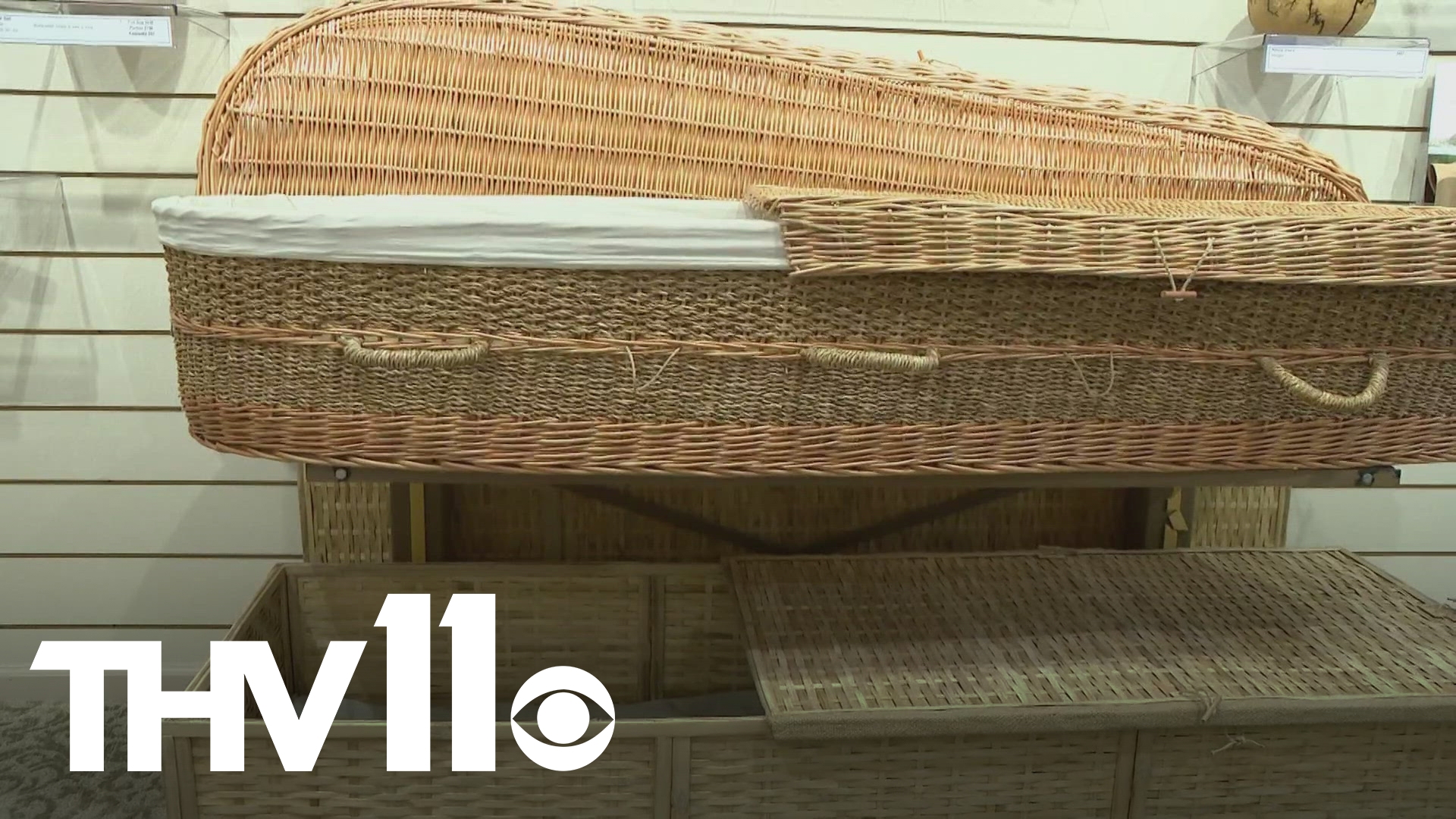ARKANSAS, USA — Among the unenviable tasks a funeral director has to perform is guiding the grief-stricken through one of the saddest times of their lives and then handing them a bill indicative of one of the most expensive times in their lives.
And lately, those costs— more than the grief— are too much to bear.
"It was just making me sick that we couldn't figure out a way for folks to have that option," said Jason Kirby, who operates his family-owned funeral and cremation center in Mountain Home. "We were seeing a lot of families that were choosing cremation solely based on price because they couldn't afford to bury their loved one."
That choice of cremation over a traditional burial with a polished casket buried six feet in the ground within a concrete vault is one of the biggest changes he's seen while growing up in the business.
"I think families' desires for lower cost options, cremation, being one of them, has presented challenges, but it's also presented positive changes in our profession," he said.
Kirby explained how cremation now makes up 70 percent of the funeral services he provides and that shift pushed him to alter the layout of the business he grew up in.
He recalls doing homework on an embalming table next to his father. That clinical room now takes up less space. His childhood bedroom once adjoined a small showroom for urns. Now, the showrooms have swapped places. Casket displays are toward the back of the house.
"We added the crematory here [in 2016] and designed this room just for our cremation families," Kirby said while touring through a space filled with comfortable sofas, plenty of tissue boxes, and the hum of a huge cremation furnace on the other side of a window and sand-colored walls.
The space allows families to actually play a role in placing their loved ones in the massive chamber. They could also choose to just be in the room close by as the process takes place. Either way, it allows Kirby to sell a more affordable full-service experience.
"Does any economic industry come to mind that prices haven't gone up in the last 30 or 40 years?" asked Robert Akers, the director of the state funeral and burial division. It resides within the insurance department and is the place where complaints about costs often end up.
He's picked up on the trend toward cremation.
"I'd say 10 or 15 years ago, no one wanted to talk to cremation," said Amy Goode, the executive secretary for the state funeral commission. "My mom would tell you, 'don't you cremate me. I want to be buried.'"
For those people daunted by the costs of a full-service burial, the funeral board can do very little, but Goode has been closely following something Kirby is trying.
"'Green burial' typically is no casket, no vault, no embalming, wrapped in a shroud placed in the ground covered with dirt," Goode explained.
Right now, Kirby is the only professional in Arkansas offering the simplified concept.
"Folks are able to not have to put so much money in products, but still have the services that they want and go to a beautiful cemetery," Kirby said while pointing to a key reason he has pioneered green burial: a perpetual care cemetery that his family owns and maintains.
Kirby's Tucker Memorial Cemetery has all the traditional things you would expect with raised headstones over concrete vaults six feet below the tightly mowed grass. It has marble mausoleums and a garden just for scattering ashes. But it also has a special area roped off toward the back of the property specifically for green burials.
"We have shallow graves, and no caskets, no vaults, all-natural embalming fluids, if any at all, and the markers are going to be different," said Kirby while offering a tour and describing how grave markers are rough cuts of stone discarded in the process of making traditional headstones.
It keeps with the theme of recycling. Initially, demand for natural organic reduction (the more technical term for "green burials") has come from people concerned about the environment.
Goode has been monitoring other methods tried in other states with an eye on whether other Arkansas funeral directors may soon join Kirby.
"We want to be proactive versus reactive," she said of early efforts to prepare legislation and regulations for the future. "I think it's going to be a while in the state of Arkansas before we'll see really, anyone wanting to put in an alkaline hydrolysis chamber or "n.o.r." natural organic reduction because it's just not here yet."
"I think maybe as the technology becomes more prevalent, as it gets more advertising and more exposure in the industry, we'll see increased inquiries," said Akers.
However, another factor could accelerate that timetable.
"It's about half the cost of a traditional burial," Kirby said. "We have packages that are in the $4,000 range for a green burial."
That should appeal to people who have been hoping to avoid a legacy of a huge burial bill and join those looking to reduce the impact on the Earth as they're placed in the Earth.
"There's still a place for families that want to have a casket," said Kirby. "There are going to be those folks that want to be cremated, but I think it's we're feeling really good that we have one more choice for the families that we're taking care of."

